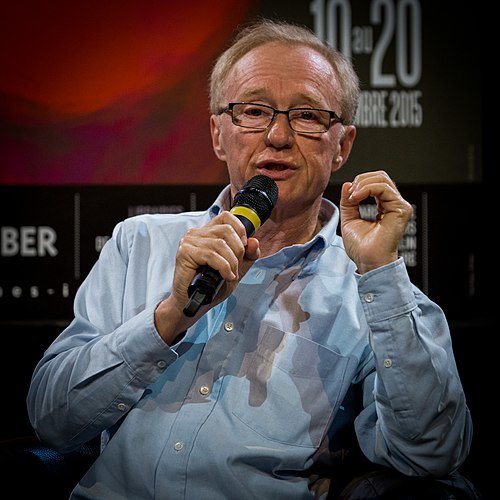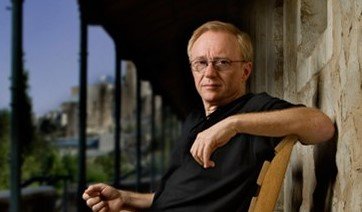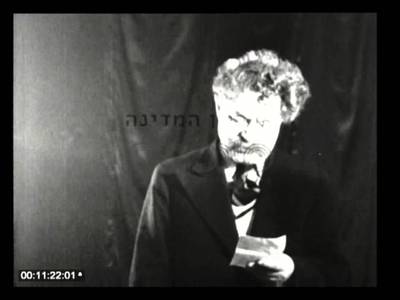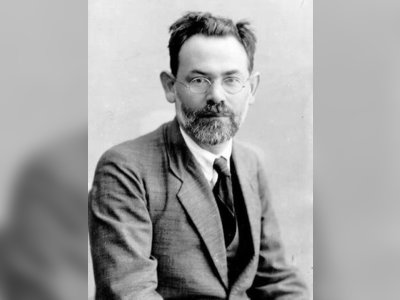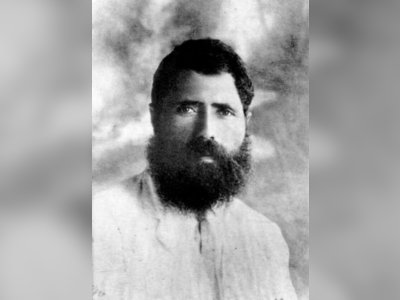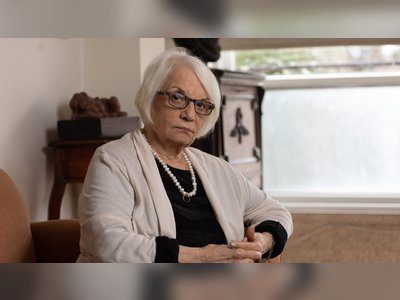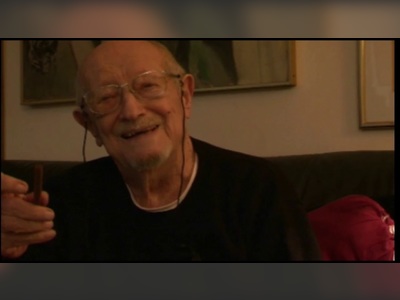מורשת גדולי האומה
בזכותם קיים
beta
David Grossman: A Literary Journey
David Grossman, born on January 25, 1954, in Jerusalem, is a multifaceted Israeli talent—author, journalist, poet, and radio broadcaster. His works have been translated into numerous languages and have garnered international recognition and acclaim.
Grossman has received several prestigious awards, including the Prime Minister's Prize for Literature, the Nelly Sachs Prize, the A.M. Klein Prize, the Sapir Prize, the Albatross Prize, and the International Man Booker Prize. He is also an honorary foreign member of the American Academy of Arts and Sciences and a recipient of the Israel Prize for Literature in 5778 (2018). Furthermore, he is a Fellow of the Royal Society of Literature (RSL) in Britain.
In all of his literary endeavors, Grossman employs modern literary tools such as stream of consciousness, various narrative perspectives, and a blend of imagination with reality, particularly in his children's stories.
David Grossman was born to Michaela, a Jerusalem native, and Yitzhak, a Polish immigrant. His younger brother, Nir, is a sports journalist. Grossman's love for literature blossomed at home, especially for Yiddish literature. He attended the "Beit HaKerem" elementary school and the "High School Near the University" in Jerusalem, where he was part of the first Eastern-oriented track established at the school.
At the age of nine, Grossman embarked on his journey as a young writer. After his military service in Unit 8200, he continued his career at "Kol Israel" radio and studied philosophy and theater at the Hebrew University of Jerusalem.
His first short stories were published in the literary magazine "Siman Kri'a." In 1979, shortly before publishing his first story collection, "Ratz" (Run), Grossman won the Neuman Prize for his story "Yani on the Mountain." His story "Chamorim" (Donkeys) also won the First Harry Prize in 1980.
Grossman worked at "Kol Israel" as a writer and satirist, and he was one of the creators of "Hatul B'Shak" (Cat in a Bag), where his satirical book "Du-Krav" was first broadcast. He also co-hosted the humorous series "Stutz" with Danny Alder. Grossman lent his voice to various characters in the radio series "Pinocchio" in 1981, which was also narrated by Raya Admoni, his co-host in "Hatul B'Shak." Later, he hosted the program "Shirim U'shiurim" (Songs and Lessons), where young listeners received answers to their homework questions from teachers who appeared on the show. Grossman left "Kol Israel" in 1988 in protest against restrictions imposed on journalists, particularly in matters related to the Palestinians. In the same year, he received the Herzl Mountain Prize for his efforts to promote peace and understanding between Arabs and Jews.
Personal Life
David Grossman is married to Michal, and they have two sons and a daughter. Their middle son, Uri, who served in the Intelligence Corps, was killed in the Second Lebanon War, just two days after Grossman, together with Amos Oz and A.B. Yehoshua, held a press conference demanding that the Israeli government agree to a ceasefire and refrain from expanding the conflict in Lebanon. Uri, who had been part of the "Building Force" (Koach Binyan) before his death, posthumously received the rank of Lieutenant Colonel.
Two months after his son's death, Grossman delivered a central speech at the commemoration ceremony for the 11th anniversary of Rabin's assassination. In his speech, he used the phrases "hollow leadership" and "there is no king in Israel" to refer to the political and military leadership in Israel. He also called on both sides to return to negotiations and addressed the suffering from both the Israeli and Palestinian perspectives.
Since 2004, Grossman has served as the President of Keshet, the Center for Democracy Protection in Israel. In 2010, he co-founded "We Are Refugees," an organization that provides legal assistance to African refugees arriving in Israel.
His personal archive is held at the National Library.
Grossman is a member of the Public Council of the left-wing organization "B'tselem."
Following the 2023 Knesset elections and amidst the COVID-19 pandemic, Grossman called for the formation of a unity government between the "Likud" and the "Blue and White" party, although he continued to criticize Benjamin Netanyahu.
Literary Career
David Grossman embarked on his literary career in 1979 when he met Prof. Gabriel Tzur and submitted his first short stories for review. These stories eventually reached the hands of Prof. Menachem Perry, who started publishing them in the literary magazine "Siman Kri'a." His first novel, "Haiyav HaGadi" (The Genuine Smile), examined life in Judea and Samaria under Israeli rule. This book was adapted into a film directed by Shimon Dotan. In 1984, Grossman received the Prime Minister's Prize for Literature.
In the series of articles titled "HaZman HaTzahov" (The Yellow Time), published in book form in 1987 (shortly before the First Intifada), Grossman described his observations in Judea and Samaria, where he saw that "refugees had turned themselves into mirrors of the people they used to be, somewhere else, into people holding in their hands only one ability: the ability to wait." His book "Ayan Erekh: Ahava" (Blind Spot: Love), published in 1986, deals with Holocaust survivors and is told from four different perspectives.
Among his many books, Grossman published "Mishehu LeRutz Ito" (Someone to Run With) in 2000, which explores life in modern Jerusalem streets. In 2003, he released "Mavet KeDerech Chayim: Israel 10 Years After Oslo," a collection of his articles from the past decade. In these writings, one can see the hope and optimism that prevailed in the early years of this period.
In 2004, Grossman wrote the song "Shirat HaSticker" (The Sticker Song), composed of political stickers. The song was performed by the band "HaDag Nahash" on their album "Kol Dvar Mezikir Li" (Everything Reminds Me). The song became a hit.
His book "Isha Borachat MeBashura" (A Woman Flees from a Message) was published by "HaSifria HaHadasha" in April 2008.
In early 2011, Grossman's song "Katzar Peh Kol Kach HaAviv" (Spring Is So Short) was dedicated to his son Uri. The music was composed and performed by Yehuda Poliker and was featured on Poliker's album "Kol Dvar Mezikir Li." In the same year, another song written by Grossman, "Orchat Zarim" (Guests' Row), was composed by Yoni Rechter and performed by Eli Gornstein and Nurit Galron on Gornstein's album "V'Nechaye" (And We Will Live).
His Books
Grossman writes for children, young adults, and adults. All of his fiction books for adults and young adults, as well as his two non-fiction books and the play "Gan Reki" (Empty Garden), were published by "Siman Kri'a / HaKibbutz HaMeuhad" and edited by Menachem Perry. Grossman authored the following books:
Children's Books
"Yakinton VeYakintonet" (Jacinton and Jacintonette) - A series of books
Young Adult Fiction
"Shovavim" (Fledglings)
Books Adapted into Theater Productions
Several of Grossman's works have been adapted into theater productions:
* "See Under: Love"
* "Falling Out of Time"
His Letters
Grossman's letters have also been compiled and published:
* "Write Now: Letters to Israel" (2004)
Grossman's works are a reflection of his commitment to understanding human nature and the complexities of life in Israel. His ability to convey profound emotions and thoughts through his writing has made him a literary giant on the global stage. His contributions to literature, journalism, and social advocacy continue to shape the cultural and political landscape of Israel.
In all of his literary endeavors, Grossman employs modern literary tools such as stream of consciousness, various narrative perspectives, and a blend of imagination with reality, particularly in his children's stories.
David Grossman was born to Michaela, a Jerusalem native, and Yitzhak, a Polish immigrant. His younger brother, Nir, is a sports journalist. Grossman's love for literature blossomed at home, especially for Yiddish literature. He attended the "Beit HaKerem" elementary school and the "High School Near the University" in Jerusalem, where he was part of the first Eastern-oriented track established at the school.
At the age of nine, Grossman embarked on his journey as a young writer. After his military service in Unit 8200, he continued his career at "Kol Israel" radio and studied philosophy and theater at the Hebrew University of Jerusalem.
His first short stories were published in the literary magazine "Siman Kri'a." In 1979, shortly before publishing his first story collection, "Ratz" (Run), Grossman won the Neuman Prize for his story "Yani on the Mountain." His story "Chamorim" (Donkeys) also won the First Harry Prize in 1980.
Grossman worked at "Kol Israel" as a writer and satirist, and he was one of the creators of "Hatul B'Shak" (Cat in a Bag), where his satirical book "Du-Krav" was first broadcast. He also co-hosted the humorous series "Stutz" with Danny Alder. Grossman lent his voice to various characters in the radio series "Pinocchio" in 1981, which was also narrated by Raya Admoni, his co-host in "Hatul B'Shak." Later, he hosted the program "Shirim U'shiurim" (Songs and Lessons), where young listeners received answers to their homework questions from teachers who appeared on the show. Grossman left "Kol Israel" in 1988 in protest against restrictions imposed on journalists, particularly in matters related to the Palestinians. In the same year, he received the Herzl Mountain Prize for his efforts to promote peace and understanding between Arabs and Jews.
Personal Life
David Grossman is married to Michal, and they have two sons and a daughter. Their middle son, Uri, who served in the Intelligence Corps, was killed in the Second Lebanon War, just two days after Grossman, together with Amos Oz and A.B. Yehoshua, held a press conference demanding that the Israeli government agree to a ceasefire and refrain from expanding the conflict in Lebanon. Uri, who had been part of the "Building Force" (Koach Binyan) before his death, posthumously received the rank of Lieutenant Colonel.
Two months after his son's death, Grossman delivered a central speech at the commemoration ceremony for the 11th anniversary of Rabin's assassination. In his speech, he used the phrases "hollow leadership" and "there is no king in Israel" to refer to the political and military leadership in Israel. He also called on both sides to return to negotiations and addressed the suffering from both the Israeli and Palestinian perspectives.
Since 2004, Grossman has served as the President of Keshet, the Center for Democracy Protection in Israel. In 2010, he co-founded "We Are Refugees," an organization that provides legal assistance to African refugees arriving in Israel.
His personal archive is held at the National Library.
Grossman is a member of the Public Council of the left-wing organization "B'tselem."
Following the 2023 Knesset elections and amidst the COVID-19 pandemic, Grossman called for the formation of a unity government between the "Likud" and the "Blue and White" party, although he continued to criticize Benjamin Netanyahu.
Literary Career
David Grossman embarked on his literary career in 1979 when he met Prof. Gabriel Tzur and submitted his first short stories for review. These stories eventually reached the hands of Prof. Menachem Perry, who started publishing them in the literary magazine "Siman Kri'a." His first novel, "Haiyav HaGadi" (The Genuine Smile), examined life in Judea and Samaria under Israeli rule. This book was adapted into a film directed by Shimon Dotan. In 1984, Grossman received the Prime Minister's Prize for Literature.
In the series of articles titled "HaZman HaTzahov" (The Yellow Time), published in book form in 1987 (shortly before the First Intifada), Grossman described his observations in Judea and Samaria, where he saw that "refugees had turned themselves into mirrors of the people they used to be, somewhere else, into people holding in their hands only one ability: the ability to wait." His book "Ayan Erekh: Ahava" (Blind Spot: Love), published in 1986, deals with Holocaust survivors and is told from four different perspectives.
Among his many books, Grossman published "Mishehu LeRutz Ito" (Someone to Run With) in 2000, which explores life in modern Jerusalem streets. In 2003, he released "Mavet KeDerech Chayim: Israel 10 Years After Oslo," a collection of his articles from the past decade. In these writings, one can see the hope and optimism that prevailed in the early years of this period.
In 2004, Grossman wrote the song "Shirat HaSticker" (The Sticker Song), composed of political stickers. The song was performed by the band "HaDag Nahash" on their album "Kol Dvar Mezikir Li" (Everything Reminds Me). The song became a hit.
His book "Isha Borachat MeBashura" (A Woman Flees from a Message) was published by "HaSifria HaHadasha" in April 2008.
In early 2011, Grossman's song "Katzar Peh Kol Kach HaAviv" (Spring Is So Short) was dedicated to his son Uri. The music was composed and performed by Yehuda Poliker and was featured on Poliker's album "Kol Dvar Mezikir Li." In the same year, another song written by Grossman, "Orchat Zarim" (Guests' Row), was composed by Yoni Rechter and performed by Eli Gornstein and Nurit Galron on Gornstein's album "V'Nechaye" (And We Will Live).
His Books
Grossman writes for children, young adults, and adults. All of his fiction books for adults and young adults, as well as his two non-fiction books and the play "Gan Reki" (Empty Garden), were published by "Siman Kri'a / HaKibbutz HaMeuhad" and edited by Menachem Perry. Grossman authored the following books:
Children's Books
"Yakinton VeYakintonet" (Jacinton and Jacintonette) - A series of books
Young Adult Fiction
"Shovavim" (Fledglings)
Books Adapted into Theater Productions
Several of Grossman's works have been adapted into theater productions:
* "See Under: Love"
* "Falling Out of Time"
His Letters
Grossman's letters have also been compiled and published:
* "Write Now: Letters to Israel" (2004)
Grossman's works are a reflection of his commitment to understanding human nature and the complexities of life in Israel. His ability to convey profound emotions and thoughts through his writing has made him a literary giant on the global stage. His contributions to literature, journalism, and social advocacy continue to shape the cultural and political landscape of Israel.
- דויד גרוסמןhe.wikipedia.org
